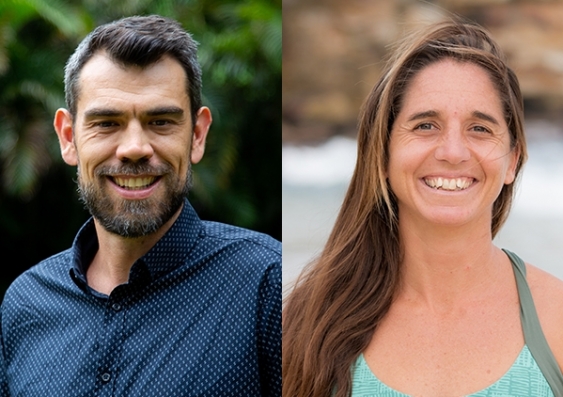Two UNSW academics have been honoured by Australian Academy of Science for their research on the impact of ocean currents on the global climate and how forests evolve and vary across Australia.

Dr Daniel Falster and Dr Laurie Menviel have been awarded Australian Academy of Science honours.
Two outstanding UNSW scientists have today been recognised by the Australian Academy of Science with 2019 honorific awards.
Scientia Fellow Dr Laurie Menviel of UNSW's Climate Change Research Centre and Dr Daniel Falster of the Evolution & Ecology Research Centre are among 20 of Australia's top scientists to be recognised with honorific awards by the country's most prestigious scientific organisation.
The Academy presents the annual medals to recognise scientific excellence by researchers from the early stages of their careers to those who have made lifelong achievements.
Dr Menviel, an early career researcher and ARC Future Fellow who received the Dorothy Hill Medal, has made major contributions to better understanding oceanic circulation, its variability and its impact on global climate, the carbon cycle and the cryosphere.
With research that focuses on understanding the role of ocean circulation in past and future abrupt climate change, Dr Menviel aims to better understand the sensitivity of ocean currents in order to improve projections of climate and sea-level rise under different scenarios.
"Given increased atmospheric greenhouse gases content, this knowledge is crucial to improving climate and sea-level projections," says Dr Menviel. "This year my research will focus on understanding some of the warmest periods of the recent past and attempting to pin point the feedbacks that led to high latitude warming, loss of continental glaciers and higher sea-levels. This an important step towards adaptation and mitigation."
2019 Dorothy Hill Medal recipient—Dr Laurie Menviel. Video: Australian Academy of Science
Ecologist and early career researcher Dr Falster received the Fenner Medal for his contribution to predicting and understanding the distribution of plant types found across Australia using evolutionary models.
"I use maths and modelling to understand why does evolution favours diversity of plant types, and why the mix of plant types vary from place to place," said Dr Falster, who is also an ARC Future Fellow. "Computer models and large data sets have enabled us to test fundamental ideas about the processes shaping biological communities."
Dr Falster's work has shown there are three core ingredients needed to maintain a diversity of types when all species compete with each other: size-structured competition for light, trade-offs in physiological function and disturbance events.
"Walking through any forest, one can be struck by the variety of plant forms coexisting. Given that all plants compete for the same basic resources, there must be a reason why is there not a single winner. I'm passionate about this research area because plants and vegetation are both fascinating and such an important part of our existence as humans. I'm also really hooked on trying to solve this big real-world problem."
By adding selection into vegetation models, Dr Falster is pioneering a model that makes predictions for the combination of traits favoured under any given environment.
Combined with the large-scale datasets he has compiled, this work promises to transform community ecology into a predictive and data-oriented science, underpinning effective ecosystem management and restoration.
Dr Falster said a new large open-source dataset on the characteristics of Australian plant species will bring in a new phase of understanding for how plants vary across the Australian landscape.
2019 Fenner Medal recipient—Dr Daniel Falster, UNSW Sydney
President of the Australian Academy of Science, Professor John Shine, congratulated all the award winners for their inspiring research.
"These awards highlight just some of the important and distinguished research being led by Australian scientists, who seek to address some of society's biggest challenges. Recognising and highlighting outstanding scientific contributions is important, as award recipients are the STEM role models for the next generation," Professor Shine said.






